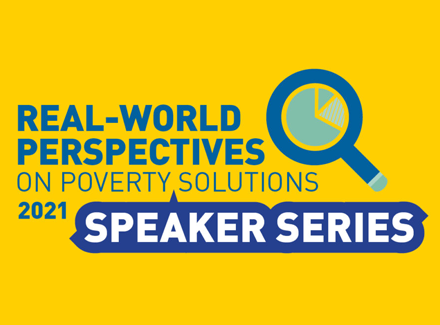Dark matter, universal child allowance up for discussion at Real-World Perspectives on Poverty Solutions series

ANN ARBOR – How did racism and sexism become embedded in our understanding of physics and the cosmos? What does the fight over the Affordable Care Act – better known as Obamacare – reveal about our country’s politics? What would it take for the U.S. to adopt a universal child allowance?
The annual Real-World Perspectives on Poverty Solutions speaker series will explore these issues and many others, featuring speakers including Chanda Prescod-Weinstein, a trailblazing theoretical cosmologist who also explores the relationship between how we understand science and broader societal justice; HuffPost Senior National Correspondent Jonathan Cohn, who covers politics and healthcare policy; and H. Luke Shaefer, the director of Poverty Solutions at the University of Michigan and a contributor to significant research on the potential of a universal child allowance to drastically reduce child poverty in the U.S.
The eight-week fall speaker series is hosted by Poverty Solutions at U-M, a university-wide presidential initiative that aims to find new ways to prevent and alleviate poverty through action-based research, in partnership with various university departments. The virtual talks, which are free and open to the public, will be livestreamed on YouTube with the opportunity for Q&A; most of the talks will run from noon to 1 p.m. EST on Fridays. U-M students can participate in the series as a one-credit course.
Here’s the speaker series lineup:
- Sept. 17: Los Angeles Mayor Eric Garcetti in conversation about affordable housing
- Sept. 24: Indivar Dutta-Gupta, co-executive director of the Georgetown Center on Poverty & Inequality
- Oct. 1: Jeremy Levine, author of “Constructing Community: Urban Governance, Development and Inequality in Boston”
- Oct. 8: Carolyn Barnes, author of “State of Empowerment: Low-income Families and the New Welfare State”
- Oct. 15: Terri Friedline, author of “Banking on a Revolution: Why Financial Technology Won’t Save a Broken System”
- Oct. 22: Jonathan Cohn, author of “The Ten Year War: Obamacare and the Unfinished Crusade for Universal Coverage”
- Oct. 29: Chanda Prescod-Weinstein, author of “The Disordered Cosmos: A Journey into Dark Matter, Spacetime, and Dreams Deferred”
- Nov. 5: Poverty Solutions Director H. Luke Shaefer as part of a panel discussing a universal child allowance
